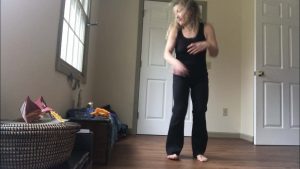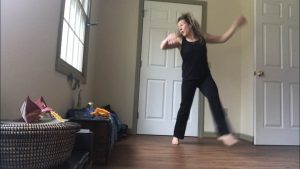 For the last two nights, I’ve slept on my back. This despite being a side-sleeper for pretty much my whole life. I have a certain way of tucking the pillow into the side of my neck, settling in, and nestling my back up to a pillow or another body. But my shoulders suffer, and the asymmetry sets me up for all kinds of misalignments. I’ve tried re-training myself many times, but I let myself go back to what’s comfortable when sleep has eluded me. This time, I think I’m on track to finally interrupt this persistent habit.
For the last two nights, I’ve slept on my back. This despite being a side-sleeper for pretty much my whole life. I have a certain way of tucking the pillow into the side of my neck, settling in, and nestling my back up to a pillow or another body. But my shoulders suffer, and the asymmetry sets me up for all kinds of misalignments. I’ve tried re-training myself many times, but I let myself go back to what’s comfortable when sleep has eluded me. This time, I think I’m on track to finally interrupt this persistent habit.
Yesterday, I logged into a zoom class that a friend led. I love his facilitation style, but I just couldn’t get into it this time. I was already feeling shut-down and discouraged, possibly because of many coronavirus deaths in my work community. Then, during the afternoon something I said contributed to disequilibrium in a whatsapp group. I apologized, but it was too late. I wasn’t wrong, exactly, but it really wasn’t my business. I wished I had stayed quiet or been more supportive. Even my ten-year-old son, Simon, felt I was in the wrong.
For a minute, I started to make a case against the person, but that fell apart pretty quickly. Then I started to make a case against myself. How I’m a bad person, how no one really likes me anyway. I started to visit past experiences, focusing on my many regrets. And I thought about all the recent emails I’ve sent that haven’t been answered, seeing it as a sign that I’m not really included or approved of, totally disregarding the fact that many people are grieving, or intolerably stressed, or have their hands overfull and answering their emails isn’t a top priority.
I really wanted to quit the group. They probably don’t want me anyway, I reasoned. But I made a recent resolution to be more present and available in group friendships–something I have struggled with–and I decided to stick it out for awhile.
 In Flowing, I rolled and stretched on the floor, keeping as much of me touching the ground as possible as I curled and flipped over, at times rolling over the back of my skull or laying flat, arms and legs outstretched, on my belly or back. On my feet, I let my arms gently follow and rub against the rest of me. I let my weight down into one foot at a time, seeing if I could connect with the center of the earth. During all of this, I was also thinking about feeling left out at work, and how to approach some of my tasks. These kinds of thought processes continued into Staccato, though I could see the pattern my mind was insisting on. In Chaos, I was more energetic, but still felt lackluster in terms of engagement. Lyrical found me briefly disengaged from persistent thinking, but still uninspired. I disconnected from the session as we moved into Stillness, and made a video for the students I teach.
In Flowing, I rolled and stretched on the floor, keeping as much of me touching the ground as possible as I curled and flipped over, at times rolling over the back of my skull or laying flat, arms and legs outstretched, on my belly or back. On my feet, I let my arms gently follow and rub against the rest of me. I let my weight down into one foot at a time, seeing if I could connect with the center of the earth. During all of this, I was also thinking about feeling left out at work, and how to approach some of my tasks. These kinds of thought processes continued into Staccato, though I could see the pattern my mind was insisting on. In Chaos, I was more energetic, but still felt lackluster in terms of engagement. Lyrical found me briefly disengaged from persistent thinking, but still uninspired. I disconnected from the session as we moved into Stillness, and made a video for the students I teach.
The video was about how our habitual fear stories can build up and cause us to feel overwhelmed, and how it is important that we learn to cut through our thoughts by coming back to the present when we start to make a case against ourselves.
In the evening, I avoided the temptation to drink wine to have a break from the difficult feelings I was experiencing. Instead, I wrote, then meditated at length, wrapped in a blanket in a dark room, lit only by one candle from my altar. I watched related thoughts arise and fall away, still making a case against myself, still feeling shut down, but gaining a little distance, and was able to sleep peacefully.
Today, things felt a little easier.
Again, I was drawn into exchanges with the same whatsapp group, but I didn’t feel disliked or disincluded. In fact, I found the people who contributed very supportive and receptive. I shared that I had been tempted to quit the group, but decided to ride it out. In the past, I’ve been inclined to shut down quickly in group relationships, but this time I wanted to try something different. I’m curious to see where it will lead, and excited about another strong community to learn from and grow with.
My biggest block in practice yesterday was in Staccato, but today I felt more connected as I joined a group of close friends on a zoom dance.
The livestream class was very clear and direct, with the teacher naming each form of each rhythm as it arose. In Flowing, I spent some time creating a perfect white circle around my home dance floor, and casting a circle spell. Then, I lost myself in weighted spins, following my intuition even if it didn’t look like typical flowing movements. The teacher offered a challenge that engaged me and I reflected that good teaching is a process of refining attention by offering hooks and challenges for students to engage with, and eventually supporting them to create refinements and challenges for themselves.
 In Staccato, I found edges and definition, sinking low in a howling yoga-goddess-pose again and again. In Chaos, spin was my thread, and I followed coiling, moving like a matrix, and flapping my head wildly as the expression of the spine in perpetual motion. In Lyrical I noticed that different dancers were highlighted on the zoom screen, and I moved in partnership with that specific dancer, assuming they, too, were seeing me. In Stillness I moved into vast space, noting the movements of clouds, the many birds I could see from the window, and wondering about arcane languages.
In Staccato, I found edges and definition, sinking low in a howling yoga-goddess-pose again and again. In Chaos, spin was my thread, and I followed coiling, moving like a matrix, and flapping my head wildly as the expression of the spine in perpetual motion. In Lyrical I noticed that different dancers were highlighted on the zoom screen, and I moved in partnership with that specific dancer, assuming they, too, were seeing me. In Stillness I moved into vast space, noting the movements of clouds, the many birds I could see from the window, and wondering about arcane languages.
After Stillness drew to a close, we came together in conversation. My newly-created zoom pattern is that I bail as soon as the music stops. Often Simon is drawing me, but it might also be that I’m uncomfortable in this kind of group friendship. Today I enjoyed the conversation, contributing and listening patiently.
Why might it be helpful to interrupt our persistent habits? In general, defaulting to our rehearsed patterns (and the mind-stories that support how we currently see ourselves) functions to keep up trapped in our small sense of self, and our painful, futile efforts to sustain our fragile ego. At this time, our patterns are rocked, and we have the choice to either dig in and insist on them, or to see them in the clear light of day and change our way of relating to them.
If there is any value to be gathered from this time–though any consideration of value in the face of such devastation is surely an expression of privilege–it is that it is an opportunity to confront and interrupt our habits, certainly on an individual level, and I hope, I pray, I intend, on a societal level, that we may establish new habits, new ways to share resources, and new ways to value our myriad contributions.
April 16, 2020, Broad Brook, Connecticut